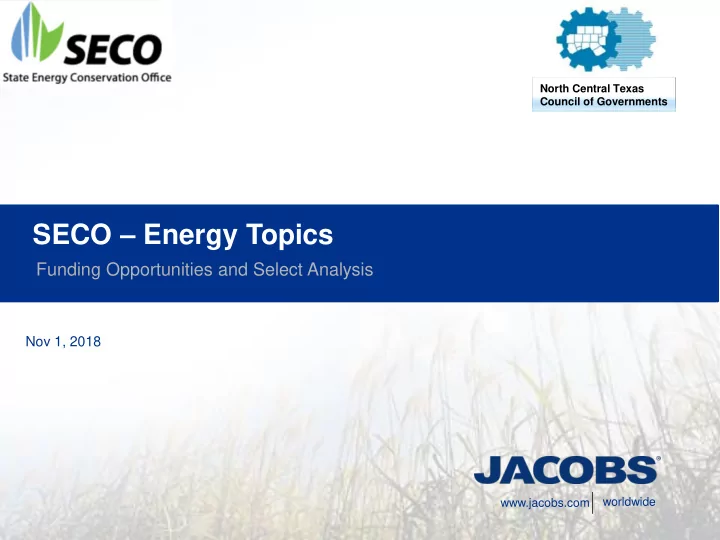

Agenda North Central Texas Council of Governments SECO – Energy Topics Funding Opportunities and Select Analysis Nov 1, 2018 worldwide www.jacobs.com 1
Introductions • Welcome • Presenter Introductions • Thanks to NCTCOG & Texas Energy Aggregation • Introduction to the State Energy Conservation Office (SECO)
Agenda Agenda 1. Overview of SECO – SECO Schools and Local Government Program – SECO LoanSTAR Revolving Loan Program 2. Changes in HVAC Design – Schools and Local Governments Considerations 3. Utility Rate Analysis – Basic Method 3
Agenda North Central Texas Council of Governments SECO – Schools and Local Governments Program RENEWABLE PROJECTS QUALIFY worldwide www.jacobs.com 4
SECO – Schools & Local Governments Program Agenda https://comptroller.texas.gov/programs /seco/
SECO – Schools & Local Governments Program Agenda
SECO – Schools & Local Governments Program Agenda Submit Service • 1 page Request Form SECO assigns an Engineer to provide • Fast Mobilization a site visit and Technical Services SECO Funded • No Obligation Report is issued to end Client
SECO – Schools & Local Governments Program Agenda Total Square Feet Assessed: 28M sq ft Annual Energy Savings: 213,266 MMBtu Annual Water Savings: 71 Million Gallons Identified Potential Annual Savings (2014 – 2016)
Agenda North Central Texas Council of Governments SECO – LoanSTAR Revolving Loan Program worldwide www.jacobs.com 9
SECO – LoanSTAR Revolving Loan Program Agenda https://comptroller.texas.gov/programs /seco/
SECO – LoanSTAR Revolving Loan Program Agenda
SECO – LoanSTAR Revolving Loan Program Agenda
SECO – LoanSTAR Revolving Loan Program Agenda Application Phase
SECO – LoanSTAR Revolving Loan Program Agenda Retrofit Phase
Agenda North Central Texas Council of Governments Texas State Energy Conservation Office (SECO) https://comptroller.texas.gov/programs/seco HVAC Design Changes Dub Taylor - Director 512.463.8352 dub.taylor@cpa.texas.gov Stephen Ross – Schools and Local Governments 512.463.1770 stephen.ross@cpa.texas.gov Eddy Trevino – Manager; LoanSTAR 512.463.1876 eddy.Trevino@cpa.texas.gov 15
Agenda North Central Texas Council of Governments HVAC Design Changes Schools and Local Governments Considerations Nov 1, 2018 Presented by: Mack Wallace, PE Program Manager Jacobs Engineering Group, Fort Worth, TX worldwide www.jacobs.com 16
What’s Happening? Changes in HVAC Design And What they mean to you
From 2004 to 2013, Eight Climate Zones for 90.1 Figure B-1 Climate Zones for United States Locations (Page 134 of Std. 90.1-2010) ASHRAE 90.1 and the IECC agreed on this map
New 9 Climate Zones — Standards 169-2013 and 90.1-2016 New for 2016 DFW The IECC 2018 did not change climate zones
50% AEDGs 7 years old
Net Zero - 2018 AEDG – Schools First
Target Site EUI IECC
Right here in DFW – page 21 of the AEDG Built in 2014, before the weather changed
Changing in Your Building – HVAC Cost % How many of you have a humidistat in your Latent Loads building Outside Air Lighting DDC Envelope Controls Equipment Sensible Loads Variable Everything
Richard J. Lee • Used DOAS to control outside air – normally largest cooling load in DFW • Used Demand-Controlled Ventilation to reduce outside air • Used Geothermal HVAC to reduce cost of rejecting heat and serve the loads with water instead of air. – Do not blow air for long distances (2018 Decentralized systems) – AEDG 2018 – Single zone chilled water fan coils, VRF systems, and GSHP – What happened to VAV systems? • You have to use DOAS in the DFW area • You do not have to use Geothermal
ASHRAE 62.1 VAV rules – Most popular System 3 1 15F max Low sensible load. difference Cooling CFM at full between supply load less than 0.5 15F max and T stat CFM. difference 100 FPM 4’ from Part load down to floor 0.2 CFM cooling. Or Heating CFM more 20% more OA to than the 50% supply warm air allowed by and return warm ASHRAE 90.1 air at the ceiling People want to have air movement % OA supplied to space is set by the space that in the space. Water 2 needs the highest % served by the AHU flow very low. Series Fan Powered Boxes are needed.
Single Zone DOAS – to the room / to the unit
Multiple Zone – to the room / to the unit ASHRAE 62.1
Use Energy Recovery – Everybody Does
Double Wheel DOAS
New RTUs – Variable Speed Compressors
Questions mack@wisewatt.com 32
Agenda North Central Texas Council of Governments SECO – Basic Utility Bill Analysis Nov 1, 2018 Presented by: Carlos Teran, PE Senior Energy Engineer Jacobs Engineering Group, Houston, TX worldwide www.jacobs.com 33
Utility Rate Analysis - Energy Cost Savings • Typical billing parameters for analysis: Supply • - Customer Charges - Supply Charges (kWh) Time-of-Use (Month, Day, Hour) ▪ Consumption Blocks ▪ Delivery • - Transmission & Distribution (kW, kWh) Time-of-Use (Month, Day, Hour) ▪ NCP (kW) ▪ 4CP (kW) ▪ Demand Ratchet (kW) ▪ Power Factor (kW) ▪ - Riders (kW, kWh) Taxes • 34
Utility Rate Analysis - Energy Cost Savings • Sample Bill 35
Utility Rate Analysis - Energy Cost Savings • Time-of-Use 36
Utility Rate Analysis - Energy Cost Savings • Riders 37
Utility Rate Analysis - Energy Cost Savings • Power Factor 38
Utility Rate Analysis - Energy Cost Savings • Unmetered Facilities 39
Recommend
More recommend